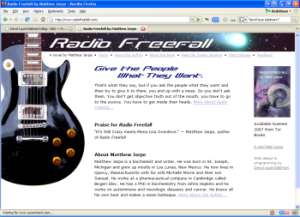I’ve gotten a few requests to finish the story of how Infoquake got published, so I’m going to go ahead and finish that tale now.
When last we left our intrepid hero (i.e., me), I had spent several years working on my science fiction manuscript, carefully researched literary agents, and sent out about two dozen packages to all of the major players.
What was my original query letter like? I reproduce it here in its entirety:
Dear [Insert Agent Name Here],
Did a flashy marketing campaign persuade Lando Calrissian to buy the Millennium Falcon? Did the company that built the Star Trek transporters have a branding strategy? Did a military contractor sell arms to the Starship Troopers — and what kind of PowerPoint presentation did he use to sell them?
As a programmer and dot-com executive, I am often frustrated by the short shrift science fiction gives to the business world. Authors who go to great lengths to make their work conform to the laws of physics will completely ignore the laws of economics. This frustration was the impetus for my first novel INFOQUAKE, a literate techno-thriller in the tradition of Neal Stephenson’s Cryptonomicon.
The book’s hero Natch is an entrepreneur in bio/logics, the programming of the human body. He’s a crusader in a war being fought through product demos, press releases and sales pitches. His Holy Grail? The number one spot on the Primo’s bio/logic investment guide.
Now Natch is willing to do anything to get his hands on a radical technology that harnesses the computing power of the mind. But so is the competition in the rough-and-tumble world of bio/logic programming. So is the ruthless Defense and Wellness Council, which sees Natch’s technology as a grave threat to public order. And so is a shadowy organization that wants to bring humanity to its next phase of evolution — ready or not. Eventually Natch must ask himself the eternal question: how far should you go to make a profit?
A little about me: I have trained Members of Congress on computer software, programmed websites for the U.S. Army, and run the marketing departments of biometric and e-commerce companies. My non-fiction has been published in the Washington Post, Baltimore Sun, Chicago Sun-Times, and Publishers Weekly. My fiction has been published in Urban Desires and Zeniada.
I would be happy to send you the complete manuscript (120,000 words) or its opening chapters, along with an outline of two proposed sequels in the INFOQUAKE trilogy. An SASE is enclosed for your convenience.
The world’s greatest cover letter? No. Good enough to get someone to crack open the manuscript? I certainly thought so. I used Andrew Zack’s example from Writer magazine as my model (Adobe Acrobat file, 89K), and I think I followed his example pretty closely. If you’ve read the final marketing copy that’s on the final book cover, you’ll see that a lot of that copy comes from this exact cover letter.
 (Matt Jarpe, by the way, is the author of the upcoming Radio Freefall, due out this summer from Tor. Matt’s also a very smart guy with a very wry sense of humor, so his blog should make for interesting reading. I’ve gotten a chance to read about half of Radio Freefall, and it’s quite a delectable concoction. I told Matt it reads like something Philip K. Dick might have written if he’d roadied for Metallica, and it’s absolutely true, and I’m going to repeat it as often as possible in hopes that Tor will stick it prominently on the book jacket.)
(Matt Jarpe, by the way, is the author of the upcoming Radio Freefall, due out this summer from Tor. Matt’s also a very smart guy with a very wry sense of humor, so his blog should make for interesting reading. I’ve gotten a chance to read about half of Radio Freefall, and it’s quite a delectable concoction. I told Matt it reads like something Philip K. Dick might have written if he’d roadied for Metallica, and it’s absolutely true, and I’m going to repeat it as often as possible in hopes that Tor will stick it prominently on the book jacket.)